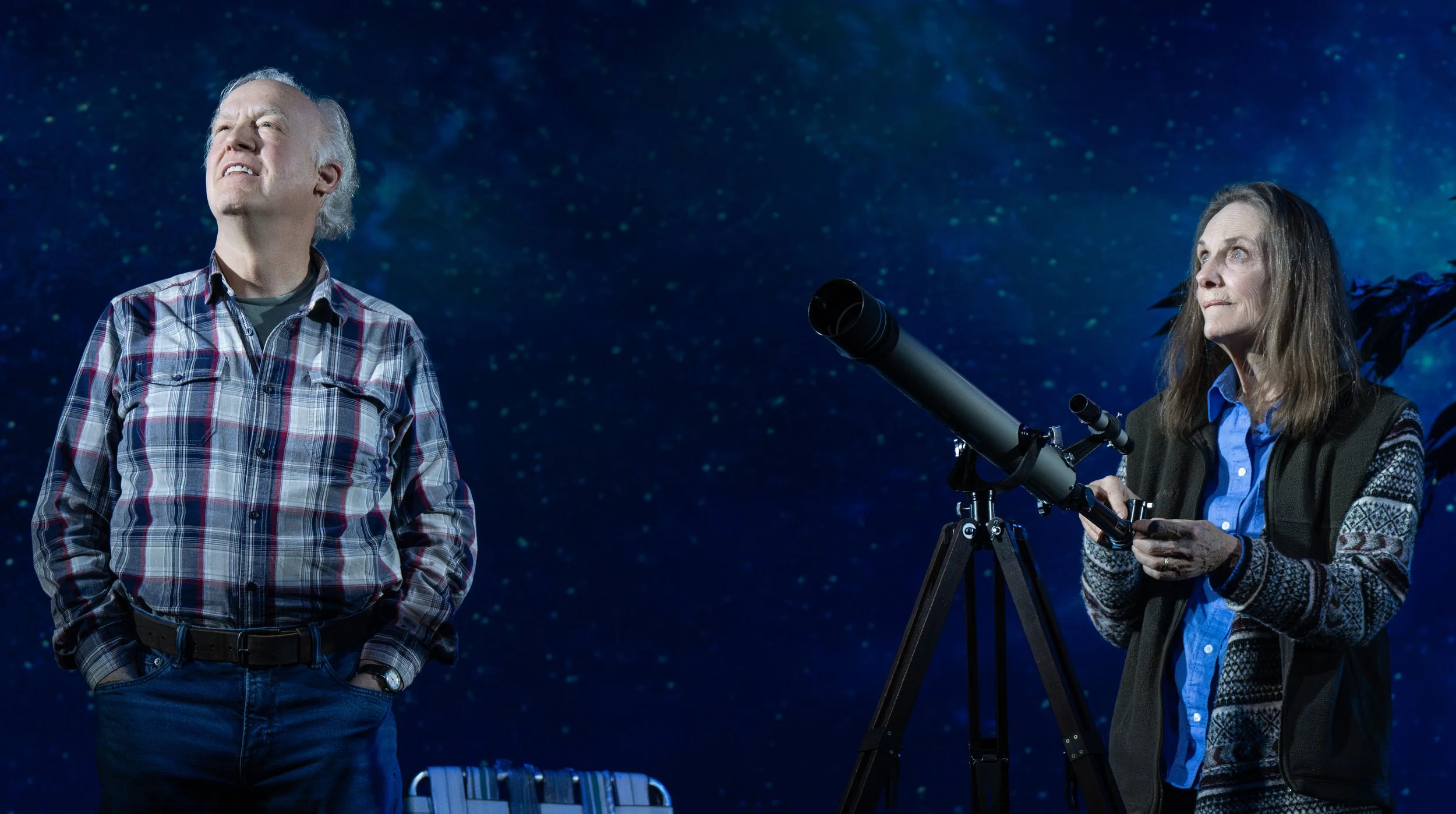Reed Birney, right, plays George, and Lisa Emery is Em, a married couple in their 70s in western Kentucky, in Donald Margulies’s two-hander Lunar Eclipse.
Lunar Eclipse, Donald Margulies’s 2023 play now receiving a Second Stage Theater production (at Signature Center), opens with one of the two characters, George, sobbing alone. George is a farmer in his 70s, sitting in darkness in a field in western Kentucky, where he is soon joined by his wife, Em, to watch a lunar eclipse. George and Em will not simply observe the overnight event: they will overcome George’s gruff exterior and look back over the course of their life together, facing difficult subjects, including the death of a child, and ultimately reaffirming their connection.
George is portrayed by Reed Birney, confirmed once again as one of the great theater actors of his generation, and so he not only pulls off a challenging opening scene—lights down, even before people have put their phones away, cue uncontrollable sobbing—but is able to obscure the play’s occasional weaknesses and, over the course of 85 minutes, convince you he simply is this person. Lisa Emery is no less excellent as Em, but her role is largely written in reaction to George, so it’s not so meaty a part.
George and Em observe an eclipse.
Margulies is a Pulitzer Prize–winning playwright (Dinner with Friends), and there is, unsurprisingly, some stellar precision in this intimate two-hander, though it veers slightly into oversentimentality and over-expostulation. And yet Birney brings one along on the ride so convincingly that those criticisms can wait for the subway ride home: I was in the moment with George, hanging on his every word.
The field where George and Em unfold their chairs is where George and generations before him buried their beloved dogs:
Sacred land. It’s a dog battlefield out here. Doggie Gettysburg. My granddad’s dogs are here, and his dad’s, the dogs my dad grew up with, the ones I grew up with, the ones you and I had together early on, that the children played with. … You piece em all together, lay em all out, head to tail, the dogs tell our story.
The latest late dog is Belle, who’s also the cause of George’s sobbing. For dogs his emotions flow, and his poetry and philosophizing are unleashed. But, as Em points out, “you’ve shed more tears for that dog than you have for your own son.” After this line comes one of the play’s transitions: pause, lights dimmed (lighting design by Amith Chandrashaker), and a projection to initiate the next scene (designed by S. Katy Tucker) by indicating how much time has passed via the phases of the eclipse (e.g., “Middle of Totality,” “Total Eclipse Ends”).
The outdoor oasis where the longtime married couple grapple with their lives is beautifully designed by Walt Spangler, taking advantage of the length of the Irene Diamond Stage; Sinan Refik Zafar’s sound design of insects and other rural nighttime noises enhances the immersive atmosphere.
George tries to tempt Em with some bourbon. Photographs by Joan Marcus.
For someone who supposedly doesn’t talk a lot (as Em repeatedly points out), George is more than ready to dish in these predawn hours. Nor does he need much prodding to delve into difficult personal subjects, including his early signs of dementia. He happily conveys his disdain for religion and his political views: “What if this time the forces of evil are here to stay? ... Poisoned this land. … Got everybody at their neighbors’ throats and they got to burn up the planet and mess with our children’s minds.”
Is this, perhaps, a bit of wishful thinking—a character who speaks in a way that a New York City audience might want people in western Kentucky to sound? The rural setting also feels more universal than specific, although the script is dedicated to Margulies’s farmer father-in-law, so perhaps there is a detailed basis for the character and setting. Regardless, the play works best when the focus is small and personal. Em’s reminders to George that she brought his fleece if he gets cold—and his grudging acceptance—reveal a deep, lived-in intimacy.
Moment to moment, Birney and Emery are fantastic, and Kate Whoriskey’s sensitive and astute direction culminates in a breathtaking final scene, when the clock is turned back to another moment in this same spot. As Birney’s body language changes to inhabit George’s younger self, there’s the astonishing feeling of witnessing something rare. Is this a magic trick? A lunar eclipse? Even better—an actor in his element.
Second Stage’s Lunar Eclipse runs through June 22 at Signature Theatre (480 W. 42nd St.). Evening performances are Tuesday through Saturday at 7 p.m.; matinees are Wednesday, Saturday, and Sunday at 2 p.m. For tickets, visit 2st.com.
Playwright: Donald Margulies
Director: Kate Whoriskey
Scenic Design: Walt Spangler
Lighting Design: Amith Chandrashaker
Costume Design: Jennifer Moeller
Sound Design: Sinan Refik Zafar
Video & Projection Design: S. Katy Tucker
Original Music: Grace McLean





